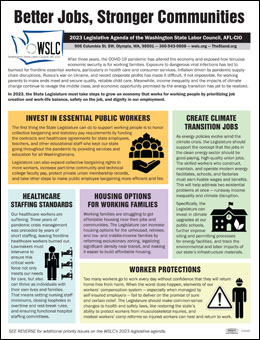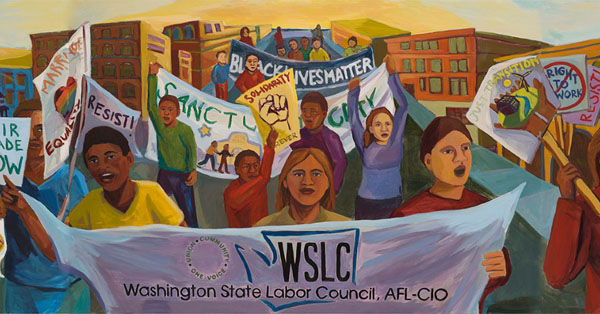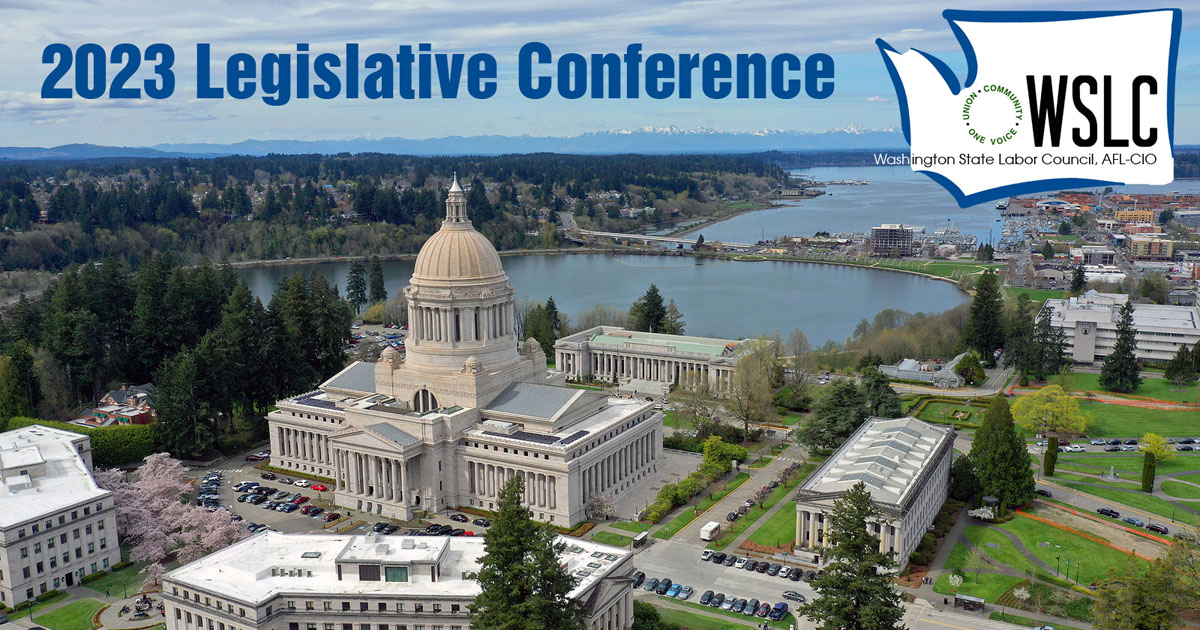STATE GOVERNMENT
WSLC announces 2023 agenda for state legislature
Washington’s union movement will seek ‘Better Jobs, Stronger Communities’
OLYMPIA (Jan. 5, 2023) — After three years, the COVID-19 pandemic has altered the economy and exposed how tenuous economic security is for working families. Exposure to dangerous viral infections has led to burnout for frontline essential workers, particularly in health care and consumer services.
Inflation driven by pandemic supply-chain disruptions, Russia’s war on Ukraine, and record corporate profits has made it difficult, if not impossible, for working parents to make ends meet and secure quality, reliable child care. Meanwhile, income inequality and the impacts of climate change continue to ravage the middle class, and economic opportunity promised by the energy transition has yet to be realized.
 In 2023, Washington’s labor movement is calling on the State Legislature to take steps to grow an economy that works for working people by prioritizing job creation and work-life balance, safety on the job, and dignity in our employment. With those objectives in mind, the Washington State Labor Council, AFL-CIO — the state’s largest union organization, which represents the interests of some 550,000 rank-and file members in more than 600 different unions — today released its “Better Jobs, Stronger Communities” legislative agenda for the 2023 session that begins Monday, Jan. 9. (Download 1-page (front-and-back) summary or a 4-page version, which includes bill numbers.)
In 2023, Washington’s labor movement is calling on the State Legislature to take steps to grow an economy that works for working people by prioritizing job creation and work-life balance, safety on the job, and dignity in our employment. With those objectives in mind, the Washington State Labor Council, AFL-CIO — the state’s largest union organization, which represents the interests of some 550,000 rank-and file members in more than 600 different unions — today released its “Better Jobs, Stronger Communities” legislative agenda for the 2023 session that begins Monday, Jan. 9. (Download 1-page (front-and-back) summary or a 4-page version, which includes bill numbers.)
Those WSLC legislative priorities include (follow links to PDF one-pagers):
Invest in Essential Public Workers
![]() The first thing the State Legislature can do to support working people is to honor collective bargaining and statutory pay requirements by funding the contracts and healthcare agreements for state employees, teachers, and other educational staff who kept our state going throughout the pandemic. Legislators can also expand collective bargaining rights to more workers; increase pay for part-time community and technical college faculty, paraeducators and other low-wage education professionals; protect private union membership records; and take other steps to make public employee bargaining more efficient and fair.
The first thing the State Legislature can do to support working people is to honor collective bargaining and statutory pay requirements by funding the contracts and healthcare agreements for state employees, teachers, and other educational staff who kept our state going throughout the pandemic. Legislators can also expand collective bargaining rights to more workers; increase pay for part-time community and technical college faculty, paraeducators and other low-wage education professionals; protect private union membership records; and take other steps to make public employee bargaining more efficient and fair.
![]() As energy policies evolve amid the climate crisis, the Legislature should support the concept that the jobs in the clean energy sector should be good-paying, high-quality union jobs. The skilled workers who construct, maintain, and operate modern energy facilities, schools, and factories must earn livable wages and benefits. This will help address two existential problems at once — runaway income inequality and climate disruption.
As energy policies evolve amid the climate crisis, the Legislature should support the concept that the jobs in the clean energy sector should be good-paying, high-quality union jobs. The skilled workers who construct, maintain, and operate modern energy facilities, schools, and factories must earn livable wages and benefits. This will help address two existential problems at once — runaway income inequality and climate disruption.
Specifically, the Legislature can invest in climate upgrades at our public schools, further improve siting and permitting processes for energy facilities, and track the environmental and labor impacts of our state’s infrastructure materials.
![]() Our healthcare workers are suffering. Three years of pandemic crisis management was preceded by years of short staffing, leaving frontline healthcare workers burned out. Lawmakers must intervene to ensure this critical workforce not only meets our needs for care, but also can thrive as individuals with their own lives and families. That means setting nursing staff minimums, closing loopholes in overtime and rest-break rules, and ensuring functional hospital staffing committees.
Our healthcare workers are suffering. Three years of pandemic crisis management was preceded by years of short staffing, leaving frontline healthcare workers burned out. Lawmakers must intervene to ensure this critical workforce not only meets our needs for care, but also can thrive as individuals with their own lives and families. That means setting nursing staff minimums, closing loopholes in overtime and rest-break rules, and ensuring functional hospital staffing committees.
![]() Too many workers go to work every day without confidence that they will return home free from harm. When the worst does happen, elements of our workers’ compensation system — especially when managed by self-insured employers — fail to deliver on the promise of sure and certain relief. The Legislature should make common-sense changes to health and safety laws, like restoring the state’s ability to protect workers from musculoskeletal injuries and protecting warehouse workers from dangerous production quotas, and modest workers’ comp reforms so injured workers can heal and return to work.
Too many workers go to work every day without confidence that they will return home free from harm. When the worst does happen, elements of our workers’ compensation system — especially when managed by self-insured employers — fail to deliver on the promise of sure and certain relief. The Legislature should make common-sense changes to health and safety laws, like restoring the state’s ability to protect workers from musculoskeletal injuries and protecting warehouse workers from dangerous production quotas, and modest workers’ comp reforms so injured workers can heal and return to work.
Housing Options for Working Families
![]() Working families are struggling to get affordable housing near their jobs and communities. The Legislature can increase housing options for the unhoused, retirees, and low- and middle-income families by reforming exclusionary zoning, legalizing significant density near transit, and making it easier to build affordable housing.
Working families are struggling to get affordable housing near their jobs and communities. The Legislature can increase housing options for the unhoused, retirees, and low- and middle-income families by reforming exclusionary zoning, legalizing significant density near transit, and making it easier to build affordable housing.
The WSLC will also support the following priorities:
- Workforce Development — Washington must make significant investments in workforce development. We can widen the pipeline for skilled, professional nurses and healthcare workers, secure and grow our manufacturing workforce to leverage domestic supply chain development opportunities, and build the climate and transportation infrastructure necessary to deliver on our state’s energy transition.
- Improve access to early learning and child care by establishing a bonus for non-standard hours of care at Early Achievers facilities, ensuring flexible work and income requirements for apprentices seeking childcare assistance, and creating a pilot program for childcare facilities near construction job sites.
- Protect employee free speech by banning captive-audience meetings that bosses use to bust unions and intimidate workers exercising their freedom to organize.
- Support teacher residencies to improve workforce diversity and address subject-matter staffing shortages.
- Strengthen Paid Family & Medical Leave by adopting recommendations of Legislative Task Force.
- Promote paid sick leave for construction workers unable to utilize benefits from the landmark 2016 law.
- Fully fund public pensions and make improvements for those with low benefits or who lack COLA adjustments.
- Grant unemployment insurance to workers currently not covered because of their immigration status.
- Ensure hospital mergers don’t limit healthcare access.

In addition to this 2023 Better Jobs, Strong Communities Agenda, the WSLC will support other legislation championed by its affiliated unions and a range of issues to address economic opportunity and justice.
In the coming weeks, the WSLC will be posting more information on these legislative priorities. Look for that information at the State Government section of The Stand and at the Legislative Advocacy section of wslc.org.
 The WSLC will host its 2023 Legislative Reception and Conference on Feb. 2-3 at the Olympia Hotel on Capitol Lake. After conducting virtual conferences throughout the pandemic, the WSLC is very excited to be able to meet in-person in 2023 while adhering to CDC-recommended COVID-19 testing and safety protocols. Get details or go ahead and register now.
The WSLC will host its 2023 Legislative Reception and Conference on Feb. 2-3 at the Olympia Hotel on Capitol Lake. After conducting virtual conferences throughout the pandemic, the WSLC is very excited to be able to meet in-person in 2023 while adhering to CDC-recommended COVID-19 testing and safety protocols. Get details or go ahead and register now.





